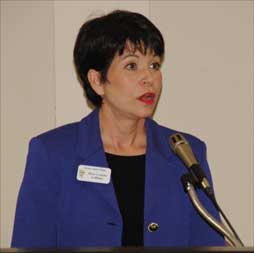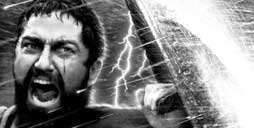By Theneisha Smith/reporter
A piece of poetic and musical history visited all four campuses this month to highlight National Poetry Month.
The Langston Hughes Project Ask Your Mama: 12 Moods for Jazz, a multimedia event with spoken word, jazz quartet and visual illustration, is Hughes’ epic 12-part, 600-line poem scored with musical cues from the author.
The multimedia presentation pays tribute in verse and song to the struggle for social and artistic freedoms in America and abroad during the 1960s.
At the end of each stanza, Hughes repeats “ask your mama” as an homage to playing the dozens. The dozens is a game of trading insults, usually about an opponent’s mother.
Hughes uses the words as a play on the fact that while he has attained success, he is never allowed to be truly equal.
While not a musician, Hughes was a lover of jazz and wrote this poem while attending the Newport Jazz Festival in the early 1960s. He read the poem to a jazz music background and planned to collaborate with jazz bassist Charles Mingus to create the musical accompaniment to his poem. Although Hughes never got the opportunity to add the music, he left musical cues in the margin of the poems.
It was these musical cues that Dr. Ron McCurdy, the project’s music director, and pianist Eli Brueggemann used to score the music to the poem. When writing the music, the duo wanted to match the music to the words Hughes wrote.
The musical cues Hughes left range from vague to ethereal, from gospel cha-cha to a nice blues sound in “The Hesitation Blues,” McCurdy said. Written by legendary Blues musician W. C. Handy, the song references a man asking a woman, “Can I get it now, or do I have to wait?” Hughes’ theme for the song was equality: “Will I get it now, or will I have to wait?”
This work was originally an academic presentation by McCurdy while at the University of Minnesota. He said his first presentation was put together very quickly and was not as organized as this current production.
“ You can’t see the production one time and fully understand it,” McCurdy said. “It must be seen several times to get Hughes’ full understanding.”
McCurdy’s intention was to get the students to connect with history and help them determine their place in this world. He said he wants this production to “inspire students to leave their mark, find their niche in this world.”
The visual images of the Harlem Renaissance by black artists Jacob Lawrence and Romare Bearden and photographs by Gordon Parks are linked to the spoken word and music by Damani Baker.
The music was performed by McCurdy’s jazz quartet, which features Eli Brueggemann on piano, Edwin Livingston on bass, Peter Buck on drums and McCurdy on trumpet.
Along with the quartet’s music, the Hughes project includes spoken word and singing.
At the end of the program, McCurdy reflected on the importance of viewing Ask Your Mama: 12 Moods for Jazz in April.
“ April is not only National Poetry Month, but it is also Jazz Appreciation Month and the month of Ella Fitzgerald’s birth, April 25,” he said.


























